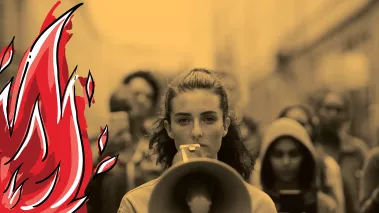Table of Contents
REPORT: Scholars punished for their speech skyrocketed over last three years

- A new report from FIRE finds that attempts to punish college and university scholars for their speech skyrocketed over the past two decades, from only four in 2000 to 145 in 2022.
- Censorship attempts came from both the political left of the scholar (52%) and the political right of the scholar (41%).
- Almost two-thirds of attempts resulted in sanction, including 1 in 5 that resulted in termination.
- The largest number of scholars targeted at once was in 2021, when the conservative organization Turning Point USA targeted 61 scholars.
PHILADELPHIA, April 20, 2023 — A professor at Concordia University in Wisconsin was suspended for criticizing his school’s “woke” policies. A professor at the University of Washington lost an endowed chair for signing a letter criticizing Israel. A professor at Emporia State University was fired after criticizing a plan to suspend tenure.
These are only a few of the cases included in “Scholars Under Fire 2000-2022,” a new report from the Foundation for Individual Rights and Expression finding that attacks on speech remain a major problem on college campuses, with an alarming increase in targeted scholars in the past three years.
The report analyzes more than two decades of trends in FIRE’s database of successful and attempted sanctions of professors, lecturers, and other scholars for controversial speech. It recounts the experiences of scholars at both public and private universities whose targeted speech is — or would be — protected under First Amendment standards.
“Cancel culture is particularly pernicious when it targets people charged with discovering and disseminating knowledge,” said FIRE Director of Faculty Outreach Komi Frey, lead author of the report. “Vocal, dogmatic minorities on the left and the right are trying to restrict the range of acceptable ideas in institutions of higher education, and this should alarm us all. You do not need to agree with a scholar’s teaching, research, or extramural speech to recognize that censorship is not the answer.”
The report finds that the annual number of sanction attempts increased dramatically over time, from only four in 2000 to 145 in 2022. The number of scholars punished in the past three years (509) nearly matches the number of scholars sanctioned in the 20 years prior to 2020 (571).
Fewer attempts to sanction scholars occurred in 2022 than in 2021 (145 vs. 213). That decline is mostly illusory, because a single campaign, Turning Point USA's "Professor Watchlist," targeted 61 scholars at once in 2021. If these 61 attempts were counted as one individual attempt, the total number of attempts in 2021 would be 153, only eight more than the 2022 count.

The school with the highest number of sanction attempts was Harvard (23), followed by Stanford (22), UCLA (19), and Georgetown (16). Harvard took the lead in 2022 by canceling a public lecture because of the scholar’s unrelated views on gender and transgender issues. The school with the highest number of successful sanctions was also Harvard (12), followed by the University of Central Florida (10), and Columbia, UCLA, and the University of Florida (tied at 9).
The University of Florida, meanwhile, leads the country in the percentage of successful sanctions, with a whopping 90%. Nine of the 10 sanction attempts at UF occurred since 2020, and none of those scholars were defended by the administration. Coming in second with a 77% successful sanction rate is another public Florida university, the University of Central Florida. (Perhaps not coincidentally, FIRE is currently suing the State University System of Florida for unconstitutionally limiting the speech of its students and scholars.)
Other notable findings from the report include:
- Almost two-thirds of sanction attempts resulted in sanction, including 225 terminations.
- Sanction attempts initiated by on-campus groups typically come from the political left of the scholar, including 75% of the attempts from undergraduates and 82% from other scholars.
- On the other hand, sanction attempts from off-campus groups typically come from the political right of the scholar, including 78% of the attempts from the general public and 86% from government officials.
- Only 6% of sanction attempts occurred because the scholar engaged in contemptuous or malicious speech, such as speech meant to offend, malign, or endorse violence.
“Even one attempted sanction is one too many,” said FIRE Director of Polling and Analytics Sean Stevens. “Over a thousand tells us there are serious problems on American campuses when it comes to free expression and academic freedom. Schools need to recommit to implementing policies fostering campus environments that reject attempts to punish protected speech.”
The Foundation for Individual Rights and Expression (FIRE) is a nonpartisan, nonprofit organization dedicated to defending and sustaining the individual rights of all Americans to free speech and free thought—the most essential qualities of liberty. FIRE recognizes that colleges and universities play a vital role in preserving free thought within a free society. To this end, we place a special emphasis on defending the individual rights of students and faculty members on our nation’s campuses, including freedom of speech, freedom of association, due process, legal equality, religious liberty, and sanctity of conscience.
CONTACT:
Alex Griswold, Communications Campaign Manager, FIRE: 215-717-3473; media@thefire.org
Recent Articles
Get the latest free speech news and analysis from FIRE.

Can the government ban controversial public holiday displays?

The trouble with banning Fizz

FIRE's 2025 impact in court, on campus, and in our culture


